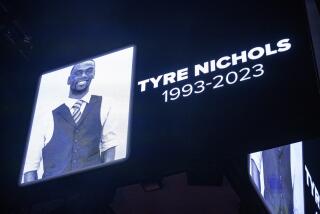Nichols’ Defense Focuses on Alleged FBI Errors
- Share via
DENVER — As the government began presenting its testimony in the second Oklahoma City bombing trial, defense lawyers for Terry L. Nichols sought Tuesday to cast doubts on the FBI’s performance in gathering evidence and to suggest that key pieces were contaminated.
The defense strategy is aimed at convincing the federal court jury that sweeping problems at the FBI crime laboratory in Washington spilled over into the bombing case, creating questions about the value of the analyses done by FBI experts on the residue of the April 19, 1995, explosion that killed 168 people.
On Tuesday, the defense closely cross-examined the first FBI official to testify in the trial about evidence that was stored in what the witness described as a dusty and crammed environment in Oklahoma City.
Attorneys for Timothy J. McVeigh, who was convicted in the bombing, also wanted to try the tactic during his separate trial this year. But U.S. District Judge Richard Matsch severely limited the amount of testimony from an internal Department of Justice investigation that found major failings at the FBI lab this year.
How far the Nichols defense will be allowed to go by Matsch remains to be seen. But the attorneys wasted no time in attempting to raise doubts about the FBI’s work.
Michael Tigar, the chief attorney for Nichols, promised as much in his opening statement Monday when he described the FBI lab chemists and technicians. “Those people ignored vital evidence, used junk science, did sloppy fieldwork and rushed to a very wrong and quite early judgment,” he said.
Nichols has pleaded not guilty in the capital murder case. His former Army friend, McVeigh, was convicted and sentenced to death.
Testifying Tuesday was James Elliott, a 32-year career FBI special agent who retired in August. Elliott served as a supervisor at the large Oklahoma City warehouse where most of the government’s evidence was stored before being shipped to the crime lab in Washington.
Under questioning from defense attorney Ronald Woods, who is also a former FBI agent, Elliott described the warehouse as cluttered with materials from other cases. He said that it was seldom cleaned and, when it was, the floor was swept only a few times.
During cross-examination, Elliott acknowledged potential flaws in the storage of evidence from the Ryder rental truck that contained the fertilizer bomb that exploded outside the Alfred P. Murrah Federal Building. Elliott said that “not every piece” of wood debris from the inside of the truck was kept sealed in bags and away from other material.
But later, under questioning by assistant prosecutor Beth Wilkinson, Elliott said that the government’s most crucial piece of evidence, a small portion of the inside of the truck, was never taken to the warehouse. Instead, he said, it was flown directly to the crime lab where experts found traces of bomb material.
Also testifying Tuesday was Helena Garrett, whose 16-month-old son was one of 15 day care center children killed in the federal building explosion. Having also testified in the McVeigh trial, she once again tearfully described her frantic search to find her son and the other children.
She later stayed with the dead babies, helping to cover them with small sheets and keep them from the broken glass.
She was not cross-examined by McVeigh’s lawyers. But Tigar asked her about a parking lot across the street where several dozen cars had been set on fire. She said that she remembered the fire and chaos in the lot, which is where the government found a key piece of the truck.
More to Read
Sign up for Essential California
The most important California stories and recommendations in your inbox every morning.
You may occasionally receive promotional content from the Los Angeles Times.











